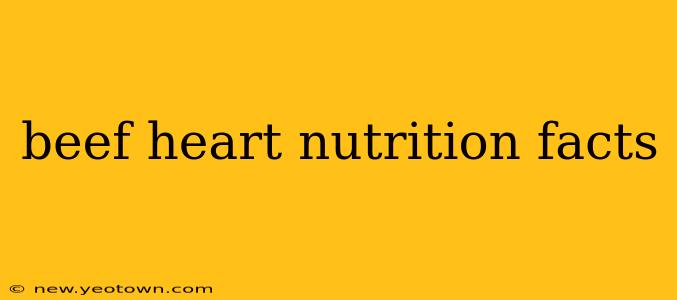For years, beef heart has quietly lingered in the shadows of more popular cuts. But this humble organ meat is experiencing a well-deserved resurgence, thanks to its impressive nutritional profile. Forget the squeamishness – let's delve into why beef heart deserves a place on your plate and explore its surprising nutritional powerhouse status. Our journey begins with a captivating story…
Imagine a bustling marketplace in a small Italian village, the air thick with the aroma of freshly baked bread and simmering sauces. Amidst the colorful displays of fruits and vegetables, a butcher proudly presents a glistening beef heart, its rich, dark color hinting at the nutritional treasures within. This isn't just meat; it's a culinary tradition passed down through generations, a symbol of hearty nourishment and resourcefulness. And today, we're uncovering the science behind this time-honored appreciation.
What are the nutritional benefits of beef heart?
Beef heart is a nutritional powerhouse, packed with vital nutrients often lacking in modern diets. It's a superior source of high-quality protein, essential for building and repairing tissues. But beyond that, it boasts an impressive array of vitamins and minerals. Let's explore some key highlights:
-
High in Protein: Beef heart is an excellent source of complete protein, containing all nine essential amino acids our bodies need but can't produce on their own. This makes it crucial for muscle growth, repair, and overall bodily function.
-
Rich in B Vitamins: This organ meat is brimming with B vitamins, vital for energy production, nerve function, and red blood cell formation. Specifically, it's a good source of B12, often deficient in vegetarian and vegan diets.
-
Excellent Source of Iron: Iron is essential for carrying oxygen throughout the body. Beef heart provides a significant amount of heme iron, a form more easily absorbed than non-heme iron found in plant-based sources. This is especially important for individuals prone to iron deficiency anemia.
-
Good Source of Selenium: This powerful antioxidant protects cells from damage caused by free radicals, reducing the risk of chronic diseases.
-
Contains Coenzyme Q10 (CoQ10): CoQ10 is a vital antioxidant that plays a key role in energy production within cells. Levels naturally decline with age, making beef heart a valuable source for boosting this important compound.
Is beef heart healthy? What are the potential health benefits?
The impressive nutritional profile of beef heart translates to a range of potential health benefits:
-
Improved Energy Levels: The abundance of B vitamins and CoQ10 contributes to enhanced energy production, combating fatigue and boosting overall vitality.
-
Stronger Immune System: The rich concentration of selenium and other antioxidants strengthens the immune system, improving its ability to fight off infections and diseases.
-
Enhanced Cardiovascular Health (Yes, Really!): While it might seem counterintuitive, the nutrients in beef heart, particularly CoQ10 and iron, can actually support heart health. However, it's important to remember that consuming beef heart as part of a balanced diet is key. Overconsumption of saturated fat should always be avoided.
-
Improved Muscle Function: The high-quality protein supports muscle growth and repair, improving strength and overall physical performance.
How much beef heart should I eat?
Moderation is key with any meat, including beef heart. While incredibly nutritious, it's relatively high in saturated fat. A balanced approach, incorporating beef heart as part of a varied diet, is recommended. Consult with a healthcare professional or registered dietitian to determine the appropriate serving size based on your individual needs and health goals.
What are the downsides of eating beef heart?
While offering numerous benefits, beef heart does come with some potential drawbacks:
-
High in Saturated Fat: This is a significant concern for individuals with high cholesterol or cardiovascular disease.
-
High in Cholesterol: Similar to saturated fat, high cholesterol intake can pose risks.
-
Potential for Contaminants: As with any meat, there's a risk of bacterial contamination if not handled and cooked properly.
How to prepare beef heart?
Beef heart requires careful preparation to achieve optimal tenderness and flavor. Slow cooking methods like braising or stewing are ideal, allowing the connective tissues to break down and create a succulent texture. Marinating the heart beforehand can further enhance its flavor and tenderness.
What is the best way to cook beef heart?
Numerous cooking methods suit beef heart. Slow cooking methods, including braising and stewing, are popular, but it can also be grilled, pan-fried, or even ground for use in dishes like burgers. The cooking time depends heavily on the cut and desired tenderness.
This detailed exploration of beef heart nutrition reveals its potential as a valuable addition to a healthy diet. Remember, always consult your doctor before making significant dietary changes. Enjoy exploring this often-overlooked nutritional powerhouse!

